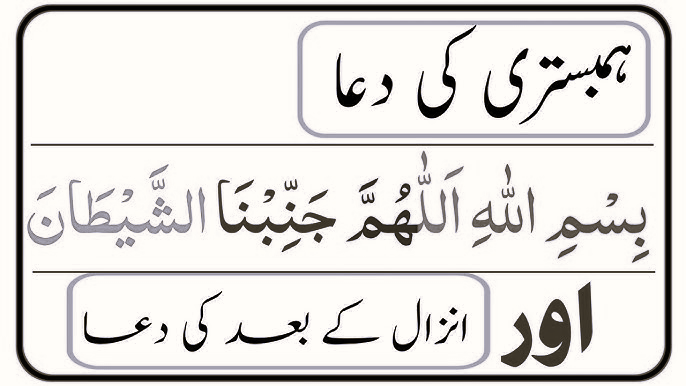Prayer for companionship is the secret to prosperity and peace in your married life(humbistAri ki dua)
What is the prayer for companionship and why is it important?
When we talk about married life, companionship is an important part of it, This is the moment when two people are closest to each other, not just in their hearts, but also in their souls, If we pray at this special moment, it can bring blessings and protection to our relationship.
The prayer for companionship(humbistari ki dua) is actually a small prayer that protects us from the evil spirit and makes our relationship strong. Islam has taught us that whenever we start any important work in our life, we should take the name of Allah. This dua is an example of the same series.

Meaning of words of dua and its meaning in Roman Urdu
The meaning of words of this dua is something like this:
“بسم الله جنة الشيطان وجنة الشيطان.”
Its meaning is:
“In the name of Allah, Allah! Save us and our children from the evil one.”
This dua should be recited before sex(humbistari ki dua) so that we can keep our relationship safe from all evils.
When and how should we recite the dua for sex?

Often people think that this dua should be recited only formally, but the truth is that this dua (humbistari ki dua) should be recited from the heart. You can recite this dua with your tongue, secretly, or by yourself in a relaxed moment.
The best thing is that you should include this dua in your life daily, whether you are newlyweds or an old husband-wife. Prayers have an effect only when there is truth in them and the request is from the heart.
Importance and benefits of prayer for companionship(humbistari ki dua)
Love and peace remain intact in the relationship: When we pray, we add a happy energy to our relationship.
- Protection from the evil: The evil always tries to create problems in our relationship, but this prayer becomes a barrier for him.
- Blessings of the relationship: Praying to Allah for blessings of your relationship makes the relationship strong and loving.
- Happiness and peace: When you mention Allah in your relationship, the heart gets a wonderful peace.
Some tips for reading Dua
- Read from the heart: Dua should not be just a matter of words, it should be a matter of the heart.
- Prepare yourself: Before Dua, calm your heart and ask for Dua from Allah with honesty and faith.
- Have faith and trust: Dua is accepted only when there is complete faith in the heart that Allah is listening to your dua.
- Usually read: The more you remember your relationship by reading dua, the more love increases in your relationship.
A small experience of the importance of dua in my life
A friend of mine told me that when he included this dua in his life after his marriage, a new color and new strength came in his relationship. He says, “Earlier we used to get angry on small things, but now patience and understanding have increased. Dua has brought peace and love in our life.”
I liked this thing very much, because in reality, small things in life make the most difference.
The meaning of prayer in the depths of a relationship
Often people ignore prayer thinking that it is just a ritual, but in reality it is a spiritual connection that exists only between Allah and you. When a husband and wife include the name of Allah in their relationship, then that relationship is not just physical or superficial – it also exists on the soul.
The prayer for companionship is, in reality, an example of that spiritual connection. This is a reminder that no matter what aspect of life it is, it is important to remember Allah.
This small prayer can have a huge impact. Think about it, when you take Allah’s name before any work, that work is done with a new blessing and protection. Similarly, when you pray before marriage, that deed is not just a physical act – it becomes a prayer.
Relationship between emotions and prayer in marriage
Marriage is not just a legal bond, but a beautiful union of emotions, understanding and dignity. Often people consider physical relationship (humbistari ki dua) as a necessity, but in reality love and spiritual connection are also necessary.
When you pray before marriage, you are not only physically close to your partner, but also emotionally and spiritually. This is an example of how you give dignity and respect to your relationship with your partner in front of Allah.
Take a small example – if you are going to meet a dear friend, you prepare from your heart, right? So when you are in the closest relationship of your life, taking the name of Allah and asking for blessings at that time becomes even more important.
Common mistakes people make in this prayer(humbistari ki dua)
1. Considering it just a formality
Many people think that it is just a hearing and ignore it. But in reality, this hearing is a blessing, which can become a means of protection for you.
2. Remembering it wrongly
Many people make mistakes in the words while remembering this prayer. It is better that you remember this prayer properly – if you are facing difficulty then write it down or save it in your mobile and read it once daily.
3. Hiding due to shame or hesitation
Reciting prayer is a form of worship, there is no shame in it. There is nothing between a husband and wife that can be hidden from each other, especially when it is a matter of worship.
It is also beneficial for the protection of children
Another very beautiful aspect of this dua is that if you read this dua before childbirth, then if Allah has written you to have children at that moment, then those children also remain safe from the effects of the devil.
This fact is not only proved by hadith, but the experiences of many people also testify this fact. Many people say that their children are very peaceful and calm – and they consider this dua to be the reason for this.
humbistari ki Dua, a medium of relationship and peace
In today’s time when relationships are a victim of stress and misunderstanding, then in such a situation if we adopt small silences, then new peace can come in life. The prayer of humbistari ki dua is one such silence which is small but its meaning is very deep.
So if you want that your relationship should not be just a relationship but should become a spiritual relationship – then from today make this prayer a part of your married life.

FAQs (humbistari ki dua)
Is this dua applicable to every married couple?
Yes, this dua is not applicable to every couple, but it is very beneficial and better. Everyone can improve their relationships by incorporating dua in their life.
If I don’t know Arabic, can I read it in Roman Urdu?
Absolutely! Allah understands the intentions of your heart. You can also pray in your own tongue.
Is it difficult to remember to recite dua?
If you recite dua once or twice daily, you will slowly remember it. Everything becomes easy with practice.
Finally: Bless your relationship with Dua
Every relationship has its ups and downs, and the moments of companionship(humbistari ki dua) also get complicated sometimes. But if we make humbistari ki Dua a part of our life, then these difficult moments turn into easy ones. Dua is such a key that fills the doors of our relationship with blessings and protection.
So from today, include the Dua of companionship(humbistari ki dua) in your married life and see how it brings new color and peace to your relationship.

AoA, my name is Abd al-Rahman, and my vision is to spread the knowledge of the Quran to everyone. I am proud and tall while standing as your trusted mentor on the journey of learning and memorizing the Holy Quran. I, along with a committed team of Islamic teachers, am bound to provide an easy online facility for Islamic studies and Hifz programs.

